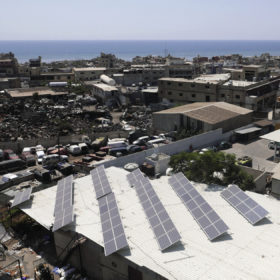Israel installs 900 MW of PV capacity in 2024
Recent data show Israel added 900 MW of solar PV capacity in 2024. The majority of the newly-added capacity stems from projects operating under merchant power purchase agreements (PPAs).
Greece awards 189 MW of battery storage in third auction
Greece’s latest auction has awarded subsidies to 188.9 MW of standalone, front-of-the-meter, utility-scale battery energy storage. The auction was the third and final edition of a battery storage subsidy program launched in 2023, with the country now turning its focus towards a new 4.7 GW unsibsidized BESS scheme.
Greece launches 4.7 GW utility-scale battery storage program
Following a brief consultation in late February, the Greek government has unveiled a new battery storage program targeting 4.7 GW of utility-scale, standalone projects which will be given a priority connection and operated on a merchant basis without subsidy support. The decision detailing the new program is the last policy made by the energy ministry before a cabinet reshuffle initiated last week.
Cyprus curtails 29% of renewable energy in 2024
Cyprus curtailed 29% of its renewable energy in 2024, a record high that signals risks to the island’s energy transition.
Cyprus introduces energy storage subsidy scheme
Cyprus’ Ministry of Energy, Commerce and Industry has launched a subsidy scheme for energy storage systems paired with existing renewable energy plants. Eligible projects will be remunerated by feed-in tariffs (FiTs) or net billing systems.
Cyprus installs 159 MW of new PV in 2024
Cyprus installed 159 MW of new solar capacity in 2024, bringing its total to 797 MW by year-end, according to the latest data from the Cypriot transmission grid operator.
Greece installs 2.6 GW of PV capacity in 2024
Greece deployed 2.6 GW of solar in 2024, bringing its cumulative installed PV capacity to 9.6 GW by the end of December.
Greece installs 400 MW of net-metered solar in 2024
Greece installed 400 MW of net-metered PV systems in 2024, bringing its cumulative distributed solar capacity to 850 MW. However, the country shifted from net metering to net billing in September.
Making Greece’s islands energy self sufficient
Greece is pursuing an ambitious island energy transition program. pv magazine visited the island of Tilos for a firsthand account of how one community has blazed a trail in the energy transition.
Israeli strikes destroy 150-200 MW of solar in Lebanon
Israel’s recent strikes have reportedly destroyed or damaged 400,000 to 500,000 solar panels, costing Lebanon an estimated 150 MW to 200 MW of installed solar capacity, according to Pierre El Khoury, former director and president of the Lebanese Center for Energy Conservation (LCEC).









